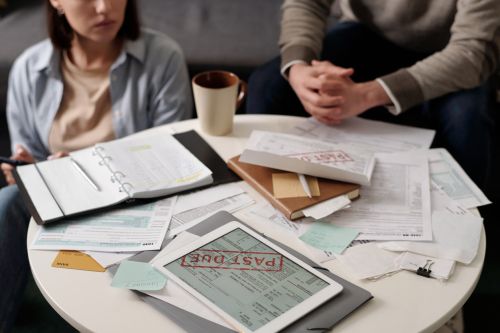Menu
Divorce Debts and Bankruptcy
October 15th, 2025

Divorce can bring many economic challenges — and you may be wondering whether filing for bankruptcy can offer you the fresh financial start you need. Although you can file for divorce and bankruptcy at the same time, doing so may not have the impact you intend. Significantly, not all debts can be discharged in bankruptcy, including those ordered to be paid in connection with the divorce proceedings.
Can You File for Divorce and Bankruptcy at the Same Time?
If you or your spouse incurred substantial debt during the course of your marriage, you might be considering whether filing for divorce and bankruptcy at the same time is a good idea. It’s not uncommon for spouses to incur a variety of debts during their marriage, including credit card debt, personal lines of credit, car loans, and mortgage payments.
Just as marital property must be equitably divided between spouses in divorce, marital debts must also be allocated and discussed as part of the dissolution of a marriage. The courts will address debts that are directly traceable to the acquisition of marital property. For instance, a judge may order that a spouse take full responsibility for an auto loan, if he or she is getting the car, or make mortgage payments on a former marital home in the divorce decree.
The Impact of the Bankruptcy Automatic Stay on Divorce
If you are considering filing for divorce and bankruptcy, it’s best to proceed with either the divorce or bankruptcy action first. This can help avoid the legal complications that can arise if both cases were brought at the same time. When a bankruptcy case has been commenced, it’s essential to understand that an automatic stay goes into effect.
Once you are in bankruptcy, the Court is precluded from making legal determinations about property that is subject to the bankruptcy proceedings. While the divorce case can proceed with resolving issues such as child custody, child support, and spousal support, marital assets would not be able to be divided until the bankruptcy case has concluded. Bankruptcy could potentially delay the divorce proceedings.
Filing for Joint Bankruptcy vs. Individual Bankruptcy
If you and your spouse have a large amount of marital debt, a joint bankruptcy filing can potentially wipe out all dischargeable marital debts that are owed by both of you — as well as your individual debts. However, it’s vital to be aware that a Chapter 7 bankruptcy can remain on your credit report for up to ten years, whether you file jointly or individually.
A Maryland family law judge will not reassign separate debts from one spouse to the other in divorce. Ultimately, a joint bankruptcy filing may not be the best way to proceed if there are few marital debts to be divided in divorce and your spouse has many individual debts. It also may not be a viable option if you and your spouse are contentious and would not be able to cooperate during the bankruptcy proceedings.
Filing for Chapter 13 Bankruptcy and Divorce at the Same Time
If you do not qualify for Chapter 7 bankruptcy, you may have the option to file for Chapter 13. This type of bankruptcy filing allows you to reorganize your debt. However, there is a long repayment period of three to five years. This means that if you file jointly with your spouse before divorce, you would be involved in the legal process with them for a lengthy amount of time — and you would also be required to communicate with them. If you would rather settle your property division matters and move on to the next chapter of your life, this may not be the best course of action for you.
Can Divorce Debts Be Wiped Out in Bankruptcy?
Not all debts can be erased by filing for divorce and bankruptcy at the same time. Domestic support obligations ordered in divorce, such as alimony and child support, are considered priority debts. This means they cannot be wiped out in bankruptcy — and these obligations must continue to be paid once the automatic stay goes into effect.
In addition, if your spouse files for bankruptcy after the divorce has been finalized and the divorce decree assigns a debt to them, the creditor can still pursue the debt against you if your name remains on the account. It’s crucial to carefully review the divorce judgment to determine what is considered a domestic support obligation or a property settlement to know what would be discharged if you or your spouse decides to file for bankruptcy following divorce. A knowledgeable divorce attorney can help you take proactive measures to safeguard your financial interests post-divorce.
Contact an Experienced Maryland Divorce Attorney
If you are wondering how filing for divorce and bankruptcy at the same time would impact your matrimonial matter, it’s best to consult with an experienced divorce attorney. At the Law Office of Shelly M. Ingram, our Fulton, Maryland divorce attorneys assist clients facing divorce with property division and debt allocation. All of our attorneys are trained in collaborative divorce, mediation, and traditional divorce litigation. We will work closely with you to find a strategy that will help you achieve the best possible outcome in your case.
To schedule a confidential consultation with an experienced Maple Lawn divorce attorney, call us at (301) 658-7354 or contact us online.


